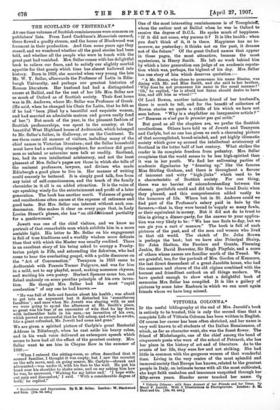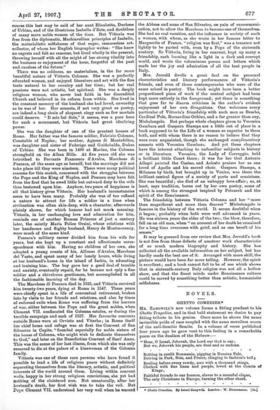VITTORIA. COLONNA.*
IF the useful bibliography at the end of Mrs. Jerrold's book is entirely to be trusted, this is only the second time that a complete Life of Vittoria Colonna has been written in English. Of course her career has been often sketched, and her name is very well known to all students of the Italian Renaissance, of which, as far as character went, she was the finest flower. The friend of Michelangelo, one of the chief among the band of eingv,ecento poets who were of the school of Petrarch, she has her place in the history of art and of literature. As to the events of her life, they were few and not striking. She bad little in common with the gorgeous women of that wonderful time. Living in the very centre of the most splendid and immoral society that Europe has known, related to the greatest people in Italy, on intimate terms with all the moat cultivated, she kept faith unshaken and innocence unspotted through her fifty-seven years. Slander never touched her name. Of • Vittoria Colon.: with Borne Account of her Friends and her Times. py Maud F. Jerrold. With 6 Illaalt'ationa in Photogravure. London: J. Ye Dent and Co. [10e. Rd. net.]
course this last may be said of her aunt Elisabetta, Duchess of Urbino, and of the illustrious Isabella d'Este, and doubtless of many more noble women of the time. But Vittoria was free from the diplomatic, Machiavellian principles of Isabella, the materialistic selfishness of that eager, remorseless art- collector, of whom her English biographer writes : "She knew no regrets and felt no remorse, but lived wholly in the present, throwing herself with all the might of her strong vitality into the business or enjoyment of the hour, forgetful of the past and careless of the future."
There was no coldness, no materialism, in the far more beautiful nature of Vittoria Colonna. She was a perfectly educated woman, and enjoyed literature and art with the fine taste natural to her country and her time; but her real passions were not artistic, but spiritual She was a deeply religious woman, who never lost faith in her discredited Church and believed in its reform from within. She lived in the constant memory of the husband she had loved, unworthy as he was of her. Her sonnets, if not very great as poetry, are indeed a long chain of eloquent elegy such as few mortals could deserve. "Il mio bel Sole," it seems, was a poor hero for snob a monument, but Vittoria had great idealising power.
She was the daughter of one of the greatest houses of Rome. Her father was the famous soldier, Fabrizio Colonna, Constable of Naples; her mother, Agnese di Montefeltro, was daughter and sister of Federigo and Guidobaldo, Dukes of Urbino. She was born in 1490 at Marino, the Colonna, stronghold on the Alban Hills. At five years old she was betrothed to Ferrante Francesco d'Avalos, Marchese di Pescara, of the same age as herself, but the marriage did not take place till they were nineteen. There were many political reasons for this match, concerned with the struggles between the Pope and the King of Naples, and Pescara may have felt from the first that he owed little but outward duty to the wife thus bestowed upon him. Anyhow, two years of happiness is all that history gives Vittoria. Her husband's inconstancies seem to have been many. Probably she was of too refined a nature to attract for life a soldier in a time when civilisation was often skin-deep, with a character. afterwards plainly shown, for which honour had not muck meaning. Vittoria, in her unchanging love and admiration for him, reminds one of another Roman Princess of just a century later, the saintly Maria Felice Orsini, whose relations with her handsome and flighty husband, Henry de Montmorency, were much of the same kind.
Pescara's military career divided him from his wife for years, but she kept up a constant and affectionate corre- spondence with him. Having no children of her own, she adopted a young cousin of his, Alfonso d'Avalos, Marchese del Vasto, and spent many of her lonely hours, while living at her husband's home in the island of Iachia, in educating and training him. The boy gave her a good deal of trouble and anxiety, eventually repaid, for he became not only a fine soldier and a chivalrous gentleman, but accomplished in all the fashionable learning of the day.
The Marchese di Pescara died in 1525, and Vittoria survived him twenty-two years, dying at Rome in 1547. These years were chiefly spent in a life of conventual retirement, broken into by visits to her friends and relations, and also by times of enforced exile when Rome was suffering from the horrors of war, either between the Pope and the great nobles, when Clement VII. confiscated the Colonna estates, or during the terrible campaign and sack of 1527. Her favourite convents outside Borne were at Orvieto and Viterbo; in Rome itself her chief home and refuge was at first the Convent of San Silvestro in Capite, "founded especially for noble sisters of the house of Colonna, who might wish to dedicate themselves to God," and later on the Benedictine Convent of Sant' Anna. This was the scene of her last illness, from which she was only removed to die at the palace of a kinswoman of the Colonna family.
Vittoria was one of those rare persons who have found it possible to lead a life of religioua peace without definitely separating themselves from the literary, artistic, and political interests of the world around them. Living within convent walla, happy in her strong religious convictions, she yet had nothing of the cloistered nun. Not unnaturally, after her husband's death, her first wish was to take the veil. But Pope Clement VII. understood her very well when he warned
the Abbess and nuns of San Silvestro, on pain of excommuni- cation, not to allow the Marchese to become one of themselves. She had no real vocation, and the influence in society of such a woman, with whom, as she wrote in her famous letter to Marguerite of France, "religion was first," was a treasure not lightly to be parted with, even by a Pope of the sixteenth century. So Vittoria, living in her convent, kept up many a friendship, each burning like a light in a dark and corrupt world, and wrote the voluminous poems and letters which made her the joy and admiration of all the best people in Italy.
Mrs. Jerrold dwells a great deal on the personal characteristics and literary performances of Vittoria's friends, and even of those contemporaries who were of the same school in poetry. The book might have been a better proportioned piece of work if the central subject had been kept more entirely in the foreground; yet there is something that goes far to disarm criticism in the author's evident enjoyment of her own divagations. One welcomes every particular of Vittoria's friendship with such men as Bembo, Cardinal Pole, Bernardino Ochino, and a far greater than any, Michelangelo. But perhaps whole chapters given to Veronica Gambian, and Gaepara Stampa are a little out of place in a book supposed to be the Life of a woman so superior to them both, and with whom there is no reason to believe that they were even acquainted, though she exchanged complimentary sonnets with Veronica Gambara. And yet these chapters have the interest attaching to unfamiliar subjects in history or in literature. Veronica, the Lady of Correggio, held a brilliant little Court there ; it was for her that Antonio Allegri painted the Casino, and Ariosto praises her as one loved of Apollo and his sacred choir. Gaspers. Stampa, a Milanese by birth, but brought up in Venice, was there the brilliant central figure of a society of poets and musicians. She was beautiful ; she died of an unhappy love-affair; so, at least, says tradition, borne out by her own poetry, some of which is among the strongest inspired by Petrareh and the spirit of the Renaissance.
The friendship between Vittoria Colonna and her "more than magnificent and more than dearest" Michelangelo is famous in the history of the world. It seems doubtful when it began; probably when both were well advanced in years. He was sixteen years the elder of the two ; the blow, therefore. fell on an old man, when " on account of her death he remained for a long time overcome with grief, and as one bereft of his senses."
It may be guessed from our review that Mrs. Jerrold's book is not free from those defects of amateur work characteristic of so much modern biography and history. She has collected all the available information on her subject, but has hardly made the best use of it. Arranged with more skill, the picture would have been far more telling. However, the spirit is excellent ; and a book cannot fail to be of use which shows that in sixteenth-century Italy religion was not all a hollow show, and that the finest minds under Renaissance culture could be moved by something better than artistic, humanistic selfishness.



























































 Previous page
Previous page